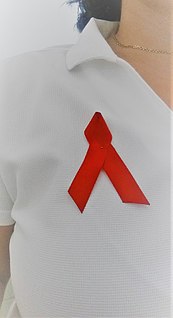 W
WAwareness ribbons are symbols meant to show support or raise consciousness for a cause. Different colours and patterns are associated with different issues.
 W
WBeanie Babies are a line of stuffed toys created by American businessman H. Ty Warner, who founded Ty Inc. in 1986. The toys are stuffed with plastic pellets ("beans") rather than conventional soft stuffing. They come in many different forms, mostly animals.
 W
WBig Mouth Billy Bass is an animatronic singing prop, representing a largemouth bass, invented on December 16, 1998, sold from January 1, 1999, and popular in the early 2000s. The fish is made of latex rubber with a plastic mechanical skeleton inside of it; at first glance, it appears to be a mounted game fish. The product was conceived by Gemmy Industries product development vice president Joe Pellettieri following a visit to a Bass Pro Shop. The device turns its head towards a person, facing them, and then wiggles its tail on its trophy plaque and sings kitschy cover songs, such as "Don't Worry, Be Happy" by Bobby McFerrin and "Take Me To The River" by Al Green, who said he received more royalties from it than from any other recording of the song. The singing mechanism was originally activated by a motion sensor and intended to startle a passerby. Eventually, a button was added to activate it. In addition, many variants of Big Mouth Billy Bass were also produced by Gemmy using different types of game fish and other aquatic animals, with some of them being Travis the Rainbow Trout, Cool Catfish, and Rocky Lobster.
 W
WA Christmas jumper is a sweater themed with a Christmas or winter-style design, often worn during the festive season. They are often knitted. A more traditional approach is a roll neck top-pulled garment.
 W
WClub drugs, also called rave drugs, or party drugs are a loosely defined category of recreational drugs which are associated with discothèques in the 1970s and nightclubs, dance clubs, electronic dance music (EDM) parties, and raves in the 1980s to today. Unlike many other categories, such as opiates and benzodiazepines, which are established according to pharmaceutical or chemical properties, club drugs are a "category of convenience", in which drugs are included due to the locations they are consumed and/or where the user goes while under the influence of the drugs. Club drugs are generally used by teens and young adults. This group of drugs is also called "designer drugs", as most are synthesized in a chemical lab rather than being sourced from plants or opiates.
 W
WCool Britannia was a period of increased pride in the culture of the United Kingdom throughout most of the 1990s, inspired by 1960s pop culture. The success of Britpop and musical acts such as the Spice Girls, Blur and Oasis led to a renewed feeling of optimism in the United Kingdom following the tumultuous years of the 1970s and 1980s. The name is a pun on the title of the British patriotic song "Rule, Britannia!"
 W
WCool Cymru was a Welsh cultural movement centred around music, independent film, and other artistic endeavours by young Welsh figures prior to and during the new millennium. It was highlighted in 1999 when the BBC announced that year as the "year of Cool Cymru".
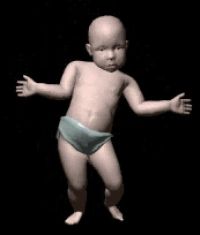 W
WThe "Dancing Baby", also called "Baby Cha-Cha" or "the Oogachacka Baby," is a 3D-rendered animation of a baby dancing. It quickly became a media phenomenon and one of the first viral videos early in the second half of the 1990s.
 W
WThe Digital Monster is a digital pet released in 1997 by Bandai. This pet was a masculine counterpart to the Tamagotchi, which was deemed more appropriate for girls. It spawned the Digimon franchise. It was similar to earlier virtual pets with the distinctions of being a fighting pet that could connect with others like it.
 W
WThe dot-com bubble was a stock market bubble caused by excessive speculation of Internet-related companies in the late 1990s, a period of massive growth in the use and adoption of the Internet.
 W
WA waist bag, or fanny pack (US), belt bag, moon bag, belly bag, gee bag, or bumbag is a small fabric pouch worn like a belt around the waist by use of a strap above the hips that is secured usually with some sort of buckle. The straps sometimes have tri-glide slides, making them adjustable in order to fit properly. It can be considered as a purse worn around the waist.
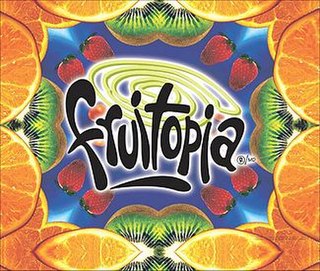 W
WFruitopia is a fruit-flavored drink introduced by The Coca-Cola Company in 1994 and targeted at teens and young adults. According to New York Times business reports, it was invented as part of a push by Coca-Cola to capitalize on the success of Snapple and other flavored tea drinks. The brand gained substantial hype in the mid-1990s before enduring lagging sales by decade's end. While still available in Canada and Australia as a juice brand, in 2003, Fruitopia was phased out in most of the United States where it had struggled for several years. However, select flavors have since been revamped under Coca-Cola's successful Minute Maid brand. Use of the Fruitopia brand name continues through various beverages in numerous countries, including some McDonald's restaurant locations in the United States, which carry the drink to this day.
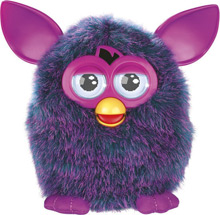 W
WFurby is an American electronic robotic toy that was originally released in 1998 by Tiger Electronics. It resembles a hamster or owllike creature and went through a period of being a "must-have" toy following its holiday season launch, with continual sales until 2000. Over 40 million Furbies were sold during the three years of its original production, with 1.8 million sold in 1998, and 14 million in 1999. Its speaking capabilities were translated into 24 languages.
 W
WGel bracelets, or jelly bracelets are a type of wristband often made from silicone.
 W
WThe George Foreman Lean Mean Fat-Reducing Grilling Machine, commonly known as the George Foreman Grill, is a portable electrically heated grill manufactured by Spectrum Brands. It is promoted by former boxing champion George Foreman. Since its introduction in 1994, over 100 million George Foreman grills have been sold worldwide.
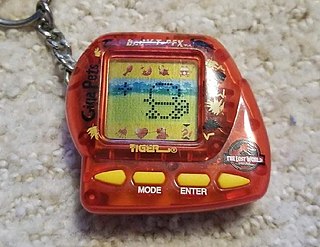 W
WGiga Pets are digital pet toys that were first released by Tiger Electronics in the United States in 1997 in the midst of a virtual-pet toy fad. Available in a variety of different characters, each Giga Pet is a palm-sized unit with an LCD screen and attached key ring. To ensure a happy, healthy pet, its owner has to take care of it similar to how one might care for a real animal, including feeding, cleaning, and playing with their Giga Pet.
 W
WGogo's Crazy Bones are small, collectible figurines that became a popular fad during the late 1990s through the 2000s. They are produced by Spanish company Magic Box Int., and PPI Worldwide Group, the sole distributor in North America.
 W
WHeroin chic was a look popularized in early-1990s fashion and characterized by pale skin, dark circles underneath the eyes, a very skinny body, dark red lipstick, stringy hair, and an angular bone structure. American "first" supermodel Gia Carangi, is remembered for being the original "heroin chic model" The look, characterised by emaciated features and androgyny, was a reaction against the "healthy" and vibrant look of models such as Cindy Crawford, Elle Macpherson, and Claudia Schiffer. A 1996 article in the Los Angeles Times stated that the fashion industry had "a nihilistic vision of beauty" that was reflective of drug addiction.
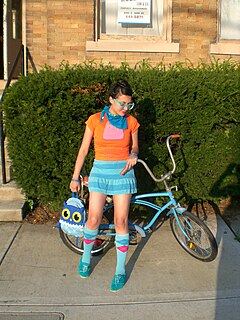 W
WIn the 21st century, a hipster is a member of a subculture that is defined by claims to authenticity and uniqueness yet, ironically, is notably lacking in authenticity and conforms to a collective style. The subculture embodies a particular ethic of consumption which seeks to commodify the idea of rebellion or counterculture. Fashion is one of the major markers of hipster identity. Members of the subculture typically do not self-identify as hipsters, and the word hipster is often used as a pejorative for someone who is pretentious or overly concerned with appearing trendy or fashionable in a non-mainstream way. Stereotypical elements include vintage clothes, alternative fashion, or a mixture of different fashions, often including skinny jeans, checked shirts, knit beanies, a full beard or deliberately attention-grabbing moustache, and thick-rimmed or lensless glasses.
 W
WJazz is a design that is featured on disposable cups. The design was introduced in 1992, and is considered an icon of 1990s culture. Jazz has also become a meme and has gained a cult following. Fans have applied the design to various objects, including automobiles, shirts, and shoes. Cups with the Jazz design were initially manufactured by Sweetheart Cup Company, which was later purchased by Solo Cup Company in 2004. Solo continued production of the disposable cups, and the Jazz design would subsequently become known unofficially as Solo Jazz.
 W
W"Macarena" is a Spanish dance song by Los del Río about a woman of the same name. Appearing on the 1993 album A mí me gusta, it was an international hit and dance craze throughout the second half of the 1990s. The song got the group ranked the "#1 Greatest One-Hit Wonder of All Time" by VH1 in 2002. The song uses a type of clave rhythm. In 2012, it was ranked No. 7 on Billboard's All Time Top 100. It also ranked at No. 1 on Billboard's All Time Latin Songs.
 W
WMagic Eye is a series of books published by N.E. Thing Enterprises. The books feature autostereograms, which allow some people to see 3D images by focusing on 2D patterns. The viewer must diverge their eyes in order to see a hidden three-dimensional image within the pattern. The term "Magic Eye" has become something of a genericized trademark, often used to refer to autostereograms of any origin. The autostereogram predates the Magic Eye series by several years. Christopher Tyler created the first black-and-white autostereograms in 1979 with the assistance of computer programmer Maureen Clarke.
 W
WThe Menacer is a light gun peripheral released by Sega in 1992 for its Sega Genesis and Sega CD video game consoles. It was created in response to Nintendo's Super Scope and as Sega's successor to the Master System Light Phaser. The gun is built from three detachable parts, and communicates with the television via an infrared sensor. The Menacer was announced at the May 1992 Consumer Electronics Show in Chicago and was released later that year. The gun was bundled with a pack-in six-game cartridge of mostly shooting gallery games. Sega also released a Menacer bundle with Terminator 2: The Arcade Game.
 W
WMighty Morphin Power Rangers is an American superhero children's television series that premiered on August 28, 1993, on the Fox Kids programming block. It is the first entry of the Power Rangers franchise, and became a 1990s pop culture phenomenon alongside a large line of toys, action figures, and other merchandise. The show adapted stock footage from the Japanese TV series Kyōryū Sentai Zyuranger (1992-1993), which was the 16th installment of Toei's Super Sentai franchise. The second and third seasons of the show drew elements and stock footage from Gosei Sentai Dairanger and Ninja Sentai Kakuranger, respectively, though the Zyuranger costumes were still used for the lead cast in these two seasons. Only the mecha and the Kiba Ranger costume from Dairanger were featured in the second season while only the Kakuranger mecha was featured in the third season, though the Kakuranger costumes were later used for the mini-series Mighty Morphin Alien Rangers. The series was produced by MMPR Productions and distributed by Saban Entertainment, while the show's merchandise was produced and distributed by Bandai Entertainment. The series was well known for its campy tone.
 W
WPokémon, also known as Pocket Monsters in Japan, is a Japanese media franchise managed by The Pokémon Company, a company founded by Nintendo, Game Freak, and Creatures. The franchise was created by Satoshi Tajiri in 1995, and is centered on fictional creatures called "Pokémon", which humans, known as Pokémon Trainers, catch and train to battle each other for sport. Games, shows and other works within the franchise are set in the Pokémon universe. The English slogan for the franchise is "Gotta Catch 'Em All".
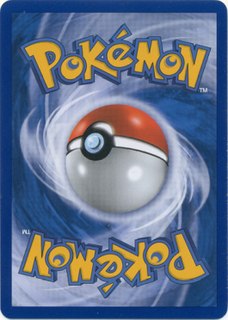 W
WThe Pokémon Trading Card Game , abbreviated to PTCG or Pokémon TCG, is a collectible card game, based on Nintendo's Pokémon franchise of video games and anime, first published in October 1996 by Media Factory in Japan. In the US, it was initially published by Wizards of the Coast; Nintendo eventually transferred the rights to The Pokémon Company which has published the game since June 2003. In 2016, it was the year's top-selling toy in the strategic card game subclass. In 2017, it had an 82% share of Europe's strategic card game market. As of March 2020, the game has sold over 30.4 billion cards worldwide.
 W
WA poseur is someone who poses for effect, or behaves affectedly, who affects a particular attitude, character or manner to impress others, or who pretends to belong to a particular group. A poseur may be a person who pretends to be what they are not or an insincere person; they may have a flair for drama or behave as if they are onstage in daily life.
 W
WThe Quebradita is a Mexican dance style. It is usually performed to a Regional Mexican song, specifically a lyrical charanga or instrumental mambo. The dance style was made especially famous by the Regional Mexican subgenre of Technobanda.
 W
WA rave is an organised dance party at a warehouse, forest, cave or other private property or public space, typically featuring performances by DJs, playing a seamless flow of electronic dance music. The word also means excellent, great, or brilliant, and can be used to describe any genre of music and entertainment. DJs at rave events play electronic dance music on vinyl, CDs and digital audio from a wide range of genres, including techno, hardcore, house, dubstep, and alternative dance. Occasionally live musicians have been known to perform at raves, in addition to other types of performance artists such as go-go dancers and fire dancers. The music is amplified with a large, powerful sound reinforcement system, typically with large subwoofers to produce a deep bass sound. The music is often accompanied by laser light shows, projected coloured images, visual effects and fog machines.
 W
WA shopping mall is a North American term for a large indoor shopping center, usually anchored by department stores. The term "mall" originally meant a pedestrian promenade with shops along it, but in the late 1960s, it began to be used as a generic term for the large enclosed shopping centers that were becoming commonplace at the time. In the U.K., such complexes are considered shopping centers, though "shopping center" covers many more sizes and types of centers than the North American "mall". Other countries may follow U.S. usage and others follow U.K. usage.
 W
WA slap bracelet is a bracelet consisting of layered, flexible stainless steel bistable spring bands sealed within a fabric, silicone, or plastic cover. It can have many different colours and/or designs.
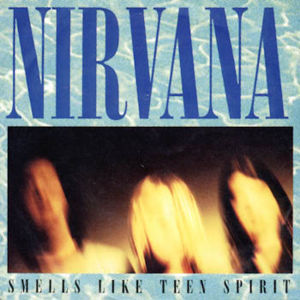 W
W"Smells Like Teen Spirit" is a song by American rock band Nirvana. It is the opening track and lead single from the band's second album, Nevermind (1991), released on DGC Records. The unexpected success of the song propelled Nevermind to the top of several albums charts at the start of 1992, an event often marked as the point where grunge entered the mainstream.
 W
WSoBe is an American brand of teas, fruit-juice blends and enhanced water beverages owned by PepsiCo. The name SoBe is an abbreviation of South Beach, named after the upscale area located in Miami Beach, Florida. In the past, the SoBe name has also been licensed for gum and chocolate products. SoBe switched from glass bottles to plastic bottles for all of its beverages in 2010.
 W
WSuper Soaker is a brand of recreational water gun that uses manually-pressurized air to shoot water with greater power, range, and accuracy than conventional squirt pistols. The Super Soaker was invented in 1989 by engineer Lonnie Johnson. The prototype combined PVC pipe, acrylic glass, and an empty plastic soda bottle.
 W
WTae Bo is a body fitness system that incorporates martial arts techniques, such as kicks and punches, which became popular in the 1990s. It was developed by American taekwondo practitioner Billy Blanks. Such programs use the motions of martial arts at a rapid pace designed to promote fitness.
 W
WThe Tamagotchi is a handheld digital pet that was created in Japan by Akihiro Yokoi of WiZ and Aki Maita of Bandai. It was released by Bandai on November 23, 1996 in Japan and on May 1, 1997 in the rest of the world, quickly becoming the biggest toy fads of the late 1990s and the early 2000s. As of 2010, over 76 million Tamagotchis had been sold worldwide. As of 2017, over 82 million units have been sold. Most Tamagotchi are housed in a small egg-shaped computer with an interface consisting of three buttons.
 W
WThe thong is a garment generally used as either underwear or as a swimsuit in some countries. It may also be worn for traditional ceremonies or competitions.
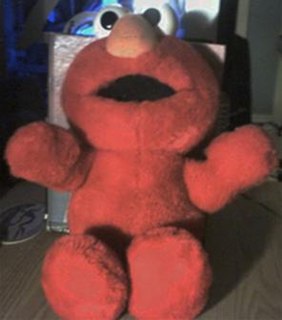 W
WTickle Me Elmo is a children's plush toy from Tyco Preschool, a division of Tyco Toys, of the Muppet character Elmo from the children's television show, Sesame Street. When squeezed, Elmo shakes, vibrates, and recites his trademark giggle, "Uh-ha-ha-ha-hee-hee!".
 W
WTrain surfing is the act of riding on the outside of a moving train, tram or another rail transport. In a number of countries, the term train hopping is used synonymously with freight hopping, which means riding on the outside of a freight train, while train surfing can be practiced on any type of train. This type of travelling can be dangerous and even life-threatening, because there is a risk of death or serious injury from falling off a moving train, electrocution from power supply, colliding with railway infrastructure while riding outside off structure gauge on the side or on the roof of a train, or unsuccessful attempts to jump on a moving train or off it. Today, the practice is forbidden by statutes on many railroads in the world. Despite this, it is still practiced, especially on those railroads where the trains are overcrowded.
 W
WTurbo was a brand of chewing gum, produced by Turkish company Kent from late 1980s to 2007. Turbo's inserts, which featured the images of various vehicles, were a collectable fad from late 1980s to 1990s.
 W
WWalkman is a brand of portable media players manufactured by Sony. The original Walkman, released in 1979, was a portable cassette player that allowed people to listen to music of their choice on the move. Its popularity made "walkman" an unofficial term for personal stereos of any producer or brand. By 2010, when production stopped, Sony had built about 200 million cassette-based Walkmans.
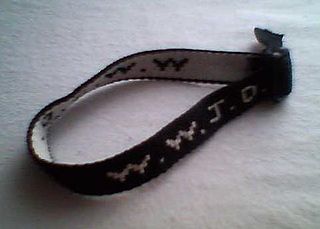 W
WThe phrase "What would Jesus do?", often abbreviated to WWJD, became popular particularly in the United States in the late 1800s after the widely read book by Charles Sheldon entitled, “In His Steps: What Would Jesus Do.” The phrase had a resurgence in the US and elsewhere in the 1990s and as a personal motto for adherents of Christianity who used the phrase as a reminder of their belief in a moral imperative to act in a manner that would demonstrate the love of Jesus through the actions of the adherents.
Where's Wally? is a British series of children's puzzle books created by English illustrator Martin Handford. The books consist of a series of detailed double-page spread illustrations depicting dozens or more people doing a variety of amusing things at a given location. Readers are challenged to find a character named Wally hidden in the group.
 W
WThe Yu-Gi-Oh! Trading Card Game is a Japanese collectible card game developed and published by Konami. It is based on the fictional game of Duel Monsters created by manga artist Kazuki Takahashi, which appears in portions of the manga franchise Yu-Gi-Oh!, and is the central plot device throughout its various anime adaptations and spinoff series.